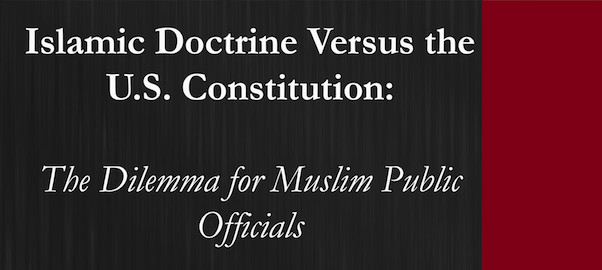CSP Press releases primer on Islamic doctrine versus the US Constitution
In anticipation of a contentious and critically important election year to come, the Center offers this new book by Dr. Stephen Kirby to serve as a resource for the engaged citizen. With more political candidates than ever openly affiliated with the Muslim Brotherhood, Dr. Kirby’s deep understanding of Islamic Law as well as the U.S. Constitution provides a useful handbook on the stark differences between them.

The Center for Security Policy is pleased to announce the publication of a new monograph by Stephen M. Kirby Ph.D. entitled Islamic Doctrine versus The U.S. Constitution: The Dilemma for Muslim Public Officials. Dr. Kirby’s timely book anticipates the 2020 election season to come with a consideration of how starkly Islamic Law differs from the U.S. Constitution in a work that is at once informative, sober, and scholarly.
Building on a series of essays that author and scholar Dr. Kirby first published at PipelineNews.org, this new book from the Center expands on the myriad ways in which Islamic Law (shariah) is antithetical to the U.S. Constitution. After introducing an overview of Islamic doctrine in brief form, Dr. Kirby then focuses on six key Amendments to the Constitution as enshrined in the Bill of Rights. In choosing these six, he both educates and horrifies any who may not have been aware of the sheer physical brutality of shariah, even aside from its explicit and tyrannical antipathy to individual liberty, free speech, and concepts such as equality of all before the rule of man-made law and government by consent of the governed.
The Center’s publication of Dr. Kirby’s book could hardly be more timely, as Muslim Brotherhood/HAMAS front groups such as CAIR (Council on American Islamic Relations) and its affiliate at Jetpac, Inc. make no secret of their intention to seed this country’s political electoral process with selected, vetted, and groomed candidates who are aligned with the Brotherhood’s jihadist agenda to foist shariah on an unwilling—but all-too-often unaware–-American electorate. Written in a lucid, readable style that takes the Bill of Rights Amendments 1, 2, 4, 8, 13, and 14 in turn to contrast them with the utter lack of those Amendments’ protections under shariah, Islamic Doctrine versus The U.S. Constitution: The Dilemma for Muslim Public Officials provides a useful handbook for the patriot citizen who understand that shariah is antithetical to the Constitution, but would like some additional pointers to rebut the plethora of Islamic apologists and taqiyya operatives out there.
The final chapter of the monograph offers even more specific ideas for those who may attend an upcoming rally, speech, or townhall featuring a Muslim candidate for office at whatever level, from local to the U.S. Congress. Here, Dr. Kirby provides a set possible questions that might be posed (with courtesy and respect) to such a candidate to help discern exactly where that candidate stands with respect to the obligatory adherence to shariah that is binding on all Muslims.
- Frank Gaffney departs CSP after 36 years - September 27, 2024
- LIVE NOW – Weaponization of US Government Symposium - April 9, 2024
- CSP author of “Big Intel” is American Thought Leaders guest on Epoch TV - February 23, 2024
